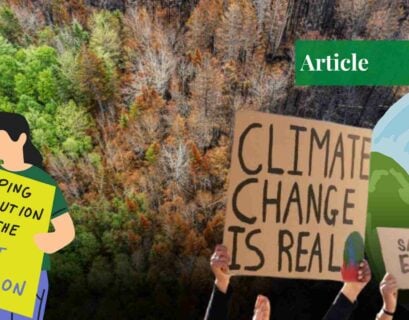Hurain Sheikh is a Pakistan-born Canadian. She has international work experience in West Canada, Dubai, and Islamabad. She is currently refining her experience by pursuing a degree in political science.
Climate change is a pressing global sustainable issue of our time. In the past few decades, states have collectively agreed on the importance of this issue and pledged to mitigate global warming. However, despite the several discussions and collective action taken to decrease the intensity of this issue, extreme climate change is globally growing frequent and destructive each passing year.
Therefore, drastic measures need to be taken to prevent these issues from getting worse. To understand the importance of this sustainable issue, the definition will be discussed, followed by applied norms and practices, and lastly, the effectiveness of these arrangements.
Definition
Since the development of industry, the issue of climate change has become an ongoing crisis due to the release of greenhouse gases, carbon dioxide, and other toxins into the atmosphere. The various forms of human activities related to industrialization, deforestation, urbanization, and economic growth have led to an increase in global climate heat.
For example, data reports accumulated by the National Aeronautics and Space Administration (NASA) indicate that the global climate has risen by 1.18 degrees Celsius; a phenomenon which is majorly being caused by carbon dioxide (CO2) emissions present in the atmosphere due to human activities.
Our consumptive and energy-based lifestyles are the reason for the increase in climate-related disasters every year, that is, record-breaking droughts, hurricanes, forest fires, floods, and loss of biodiversity. As per NASA reports, global sea levels have risen by 20 centimeters, which has led to flooding in various island republics such as the Maldives.
Since the early 1980s, the intensity and frequency of hurricanes in the North Atlantic have increased as well. The deterioration of the environment has increased human migration, depleted valuable food resources, and destroyed infrastructure, thereby constantly requiring monetary investment towards fixtures. Realistically, we cannot reverse the damage that has been done; however, states can join hands to reduce the climate risks through mitigation and adaptation.
Mitigation
The notion of mitigating and adapting to climate change is to push for habits, policies, and technology that minimize the effects of this issue and gradually slow it down. In this context, mitigation refers to reducing the toxic emissions and stabilizing the content of greenhouse gases, which is the reason for the immense amount of heat trapped in the atmosphere.
This can be done by reducing or preventing the sources that disperse these gases. For example, instead of relying upon burning fossil fuels for energy, heat, and transportation, we must explore renewable energy sources that come from the sun, water, and air.
Adopting these sustainable and eco-friendly means of producing energy will allow the ecosystem to naturally repair itself and adapt to climate change, thereby reducing its threat towards food resources and sustainably ensuring economic development.
Adaptation
Adaptation refers to making changes and taking action to prepare for and adjust to the current and future climate-related problems. Climate change is a global issue with a drastic local impact. The concept revolves around reducing human vulnerability to the adverse effects of climate change, such as rising sea levels, extreme weather, and lack of food resources.
This can be achieved through sustainable urbanization, that is, using blue-green infrastructure, reforestation of damaged areas, and diversification of crops. Additionally, the key importance of adaptation is that it depends on a case-by-case basis and the extremity of these problems is not experienced similarly by all states.
Therefore, each state has the responsibility to identify and resolve climate-related issues encountered in their communities, which may include building better infrastructures, flood defenses, and protection from heat waves.
Complexities towards Collective Action
Since the issues related to mitigation and adaptation are complex, it is also worth considering that economies highly dependent on fossil fuels cannot easily prevent or reduce activities related to them. For example, the loss of livelihood for those working in the oil, gas, and coal industries. Therefore, in some states, the issues pertaining to climate change demand a complete restructuring of the entire economy with lower economic and social implications.
Through the establishment of the Intergovernmental Panel on Climate Change (IPCC) by the United Nations in 1988, governments can obtain scientific information on these issues, aiding policymakers to formulate feasible climate-related policies.
Consequently, while states generally affirm the importance of climate change, various other issues arise including how to share responsibility and tackle the global crisis. The result of these debates has produced several important accords such as the Kyoto Protocol and the Paris Agreement, through which countries have collectively agreed to reduce greenhouse gas emissions.
Failure of the Kyoto Protocol
United Nations Framework Convention on Climate Change (UNFCCC) that came to be in 1992, encompassed 197 countries and was the first landmark treaty to address climate change issues globally by stabilizing greenhouse gases. The convention meets annually at the Conference of Parties (COP). All member states participate in the meeting to discuss actions to be taken on climate change, develop agreements and establish governance arrangements.
Kyoto Protocol (1997) was a product of these meetings, enacted in 2005. It was the first legal treaty that required the developed countries to reduce their emissions by an agreed target of 5% below 1990 levels and established a monitoring system to track their progress. This was done to ensure transparency and accountability through a registration system, annual reports, compliance, and adaptation by all related parties. However, the continuous increase in global emissions depicts a stark failure of the agreement.
Some of the various reasons for the ineffectiveness of the treaty prominently include the negligence of the United States to ratify this Protocol, followed by the withdrawal and then rejoining of Australia, and the lack of necessity for developing countries, such as China and India, to cut their emissions. This presented a critical issue as both China and India are one of the main dispensers of carbon emissions.
Therefore, this depicts a design failure of this Accord as all member states were not aligned towards the goal of mitigating climate change. Hence, there was a lack of incentive for the more important contributors towards adopting and implementing sustainable policies to reduce the rise of emissions.
The Importance of the Paris Agreement
The next treaty, a result of the meetings in the UNFCC, was the Paris Agreement in 2015. It is another legally binding international treaty towards climate change, which encompasses 196 countries. The significance of this agreement is that it requires all countries to set emissions reduction standards toward a long-term goal of neutral temperature. Essentially, this agreement is a multilateral process of a collective movement towards the prevention of climate change ensuring all nations undertake efforts for mitigation and adaptation. Therefore, governments had to set national targets towards preventing the global temperature from rising above the average of 2 Celsius pre-industrial levels and to pursue efforts to keep it below 1.5 Celsius.
Furthermore, this agreement aims for a carbon-neutral goal in the atmosphere by the second half of the century. There is more focus upon nations with global peaking temperatures to act swiftly. The treaty pushes for the establishment of a finance flow system that obliges developed countries to support the efforts of developing countries towards building a clean, climate-resilient environment and encourages voluntary contributions. It also comprises an enhanced transparency framework of state efforts towards the set goals through regular reporting on the status of their emissions and implemented efforts, which is assessed every 5 years (2023).
On-Going Failure of the Paris Agreement
Although there is a shared interest in the issues related to climate change, countries are free to set their objectives and goals with no enforcement mechanisms to ensure these are met. The US was the only country to withdraw from the accord despite being the world’s second-largest emitter towards toxic emissions. The withdrawal took place during Trump’s presidency which is now recommitted by President Biden in February 2021.
Furthermore, other countries such as Iran, Iraq, Libya, Turkey, and Yemen have not formally committed to this agreement. This causes us to wonder as to why there are not enough contributions towards this crisis. Some of these issues are related to skepticism towards the realness of climate change and its related problems from political actors as noted during Trump’s presidency. However, through the establishment of IPCC, the debate over this reality is generally falsified.
Therefore, a possibility exists of free-riding or general neglect due to the monetary contributions (lobbying) from privatized companies. This can further be noted during Trudeau’s government where preference is given to fossil fuel companies (Petro-Canada) over the adoption of environmentally friendly policies towards mitigating this global issue.
As these treaties lack punitive measures or strong incentives to follow through, some states will generally look to free ride from other states by letting them bear the burden of responsibility. However, if all states adopted this attitude, it would result in continuous failure towards climatical issues as witnessed during the Kyoto protocol.
As mentioned earlier, another ongoing debate is about who can be held majorly responsible for this global issue. While the developing countries, India and China, point towards the already developed states for being the main contributors towards this issue due to their history of industrialization, developed countries point back towards the developing countries for being the main contributors due to their current intensity of emissions.
However, current statistics generally depict the US, China, and India as top annual emitters, which leads other states to argue that these countries must do more to address climate change. Therefore, with the current attitude adopted by states of blaming, shaming, and passing on the burden, the issue of climate change continues to rise with no ambitious efforts contributed by states. Furthermore, the current pledges of policies in the Paris Agreement still result in a slow rise rather than a decrease or stagnation yet as seen in the past 4 years, there is a significant rise in temperature with 2016 and 2020 considered the hottest years in history according to NASA.
Final Thoughts
It is not to state that there is no hope or solution for this issue. It is important to take note that there is more awareness towards this global crisis than there was decades ago with greater involvement by non-political and sub-national actors, such as indigenous communities. Furthermore, numerous countries have pledged to pursue net-zero emissions and to increase their use of renewable energy, such as the European Union and Japan.
However, there is an emphasis towards larger and powerful states, such as the United States, India, and China, to contribute more towards this global issue as their current neglect is not decreasing gas emissions or adverse materials going into the environment.
Therefore, it is important on our part to elect the right leaders, promote the right groups, invest in the right companies, and practice sustainable habits. Additionally, there needs to be a stronger punitive measure applied to these universal treaties to prevent certain states from neglecting their responsibility towards this issue. For example, by breaking or enhancing trade agreements with states depending on their actions and effort towards sustainability. We must understand that climate change is a global issue that demands the collective action and participation of all individuals to save, preserve and restore our home planet.
References
- IPCC. (2021). About — IPCC. IPCC — Intergovernmental Panel on Climate Change. https://www.ipcc.ch/about/
- NASA’s Global Climate Change website. (2020, August 31). Climate change adaptation and mitigation. Climate Change: Vital Signs of the Planet. https://climate.nasa.gov/solutions/adaptation-mitigation/
- NASA. (2020, June 10). Climate change evidence: How do we know? Climate Change: Vital Signs of the Planet. https://climate.nasa.gov/evidence/
- Council on Foreign Relations. (2020, October 28). Global climate agreements: Successes and failures. https://www.cfr.org/backgrounder/paris-global-climate-change-agreements
- Rosen, A. M. (2015). The wrong solution at the right time: The failure of the Kyoto Protocol on climate change. Politics & Policy, 43(1), 30-58. https://doi.org/10.1111/polp.12105
- NASA. (2020, August 31). The causes of climate change. Climate Change: Vital Signs of the Planet. https://climate.nasa.gov/causes/
- NASA. (2020, August 25). The effects of climate change. Climate Change: Vital Signs of the Planet. https://climate.nasa.gov/effects/
- UNFCCC. (2021). About the secretariat | UNFCCC. https://unfccc.int/about-us/about-the-secretariat
If you want to submit your articles and/or research papers, please check the Submissions page.



















